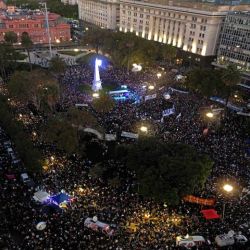Holding books aloft and pledging to defend state education, hundreds of thousands of Argentines took to the streets on Tuesday to voice outrage at cuts to universities and higher education institutions under budget-slashing new President Javier Milei.
Joined by professors, parents and alumni from the nation’s 57 state-run universities, students rose up "in defence of free public university education."
Labour unions, opposition parties and private universities backed the protests, which took place in Buenos Aires and other major cities including Córdoba, Rosario and Mar del Plata. In its entirety, it was one of the biggest demonstrations yet against the austerity measures introduced since Milei took office last December.
Police said around 100,000 people turned out Tuesday in the capital alone, while the University of Buenos Aires (UBA) put the number at closer to half-a-million. One teachers' union reported a million protesters countrywide.
The Security Ministry, headed by Patricia Bullrich, attempted to play down the turnout.
Either way, the city centre of the capital was paralysed for hours on end.
On the streets, many condemned the budget-slashing approach to state universities. Third-year medicine student Pablo Vicenti, 22, said he was outraged at the government’s “brutal attack” on the system.
“They want to defund it with a false story that there is no money. There is, but they choose not to spend it on public education,” he said.
Milei won a run-off vote last November vowing to take a “chainsaw” to public spending and reduce the fiscal deficit to zero. To that end, his government has slashed subsidies for transport, fuel and energy even as wage-earners have lost a fifth of their purchasing power. Thousands of public servants have lost their jobs, and Milei has faced numerous anti-austerity protests.
“We believe in the equalising capacity of free public education, in the transformative power of the university as a formidable tool for upward social mobility,” said 27-year-old student Piera Fernández, the defiant president of the FUA Argentine University Federation.
She read out a prepared statement agreed by university bosses to a huge crowd at the Plaza de Mayo, the epicentre of Tuesday’s rally. “Education saves us and makes us free. We call on Argentine society to defend it,” declared Fernández.
“This is important for those of us who study and for those of us who work, because public education lifts up a country,” agreed Nicolas Villagra, a 24-year-old UBA student.
The government dismissed the protests as “political,” while Milei – who left the Casa Rosada early before marchers descended on downtown Buenos Aires – took to social media to fire off messages denouncing the opposition.
Despite those claims, the march’s organisers asked demonstrators to avoid using symbols that identified them with specific political parties or groups, asking that the march be only in defence of public universities. Many families could be seen at the demonstration, which drew a wide cross-section of society.
Financial emergency
Universities declared a financial emergency earlier this year after the government approved a 2024 budget that is the same as for 2023, despite annual inflation approaching 290 percent.
On top of that, higher learning institutions say a near 500-percent monthly increase in energy costs has brought them to their knees.
“At the rate at which they are funding us, we can only function between two or three more months,” said University of Buenos Aires (UBA) chancellor Ricardo Gelpi.
Gelpi said Monday that it was “very difficult” to plan for the future. The state university has “300,000 students, 13 faculties and each one of those has a different budget,” he explained.
“If I take into account the amount of money we have, it is really very little,” Gelpi said in a radio interview.
On Monday Milei’s government conceded a 70-percent increase in funding for public universities’ operating expenses in March, to be followed by another 70 percent in May and a one-off grant to university hospitals.
Operating expenses exclude teacher salaries, which make up about 90 percent of a university budget.
“Of the four teaching categories, three have fallen under the poverty line,” said the rector of the National University of San Luis, Víctor Morinigo.
Rubén Arena, a teacher and graduate at UBA’s Faculty of Economics, said protesters wanted to “defend the future of Argentina and many generations who will be able to access an excellent education.”
Spending cuts are necessary, said the 48-year-old protester, “but not in the way they are being adjusted in universities, which allow for an upward social movement.”
In the statement read to demonstrators at the Plaza de Mayo, leaders called for wage renegotiations to be reopened without a ceiling for salaries.
‘Shady business’
In a post on X over the weekend, Milei called into question how public universities spend their funds, and said the institutions “are used for shady business and to indoctrinate.”
On Monday, Presidential Spokesman Manuel Adorni argued that Argentina’s public education system has been declining for decades, with plunging university pass rates. He claimed the government’s payment had “settled” the issue.
Interior Minister Guillermo Francos accused protesters of not fully understanding the extent of the economic crisis.
Juan Negri, director of the Political Science and International Studies programme at the Torcuato Di Tella University, said Milei “sees the kind of intellectual thinking that is characteristic of universities as an enemy.”
“For the president, science and technology are not essential,” he declared. “It is impossible to think of an Argentina without public universities.”
“We cannot cast suspicion on 200 years of history. Even with a very low budget, the UBA is among the top three [universities] in Latin America,” said the dean of the UBA’s medical school, Luis Brusco.
Some 2.2 million people study in the public university system in a country where the poverty level has reached nearly 60 percent of the population, according to a recent study.
“Don’t expect a way out through public spending,” Milei warned on Monday, as he hailed Argentina’s first quarterly budget surplus since 2008.
PoliticaL protesters
The march drew a number of political heavyweights from across party lines, including several top union leaders, Buenos Aires Province Governor Axel Kicillof, Chairman of the Unión Cívica Radical, Senator Martín Lousteau, and the man who lost last year’s presidential run-off to Milei, Sergio Massa.
Several left-wing, Peronist and centrist parties also had representatives in attendance.
Even some of the government’s friendly faces took to the streets. Journalist Eduardo Feimann – who has been a constant supporter of Milei on air – said he would attend the march.
In a segment on the LN+ news channel, the UBA law graduate argued that “money has to go to the students, to the professors, to the non-teaching staff, to the university environment so that better professionals are produced,” said Feinmann, who said it was an error to target higher education institutions.
Highlighting that state universities had produced five Nobel Prize winners, the journalist questioned the government’s position and confirmed his presence.
Bullrich, who regularly attended demonstrations while in opposition, criticised the political leaders who attended.
“It seems to me to be a total and absolute lack of responsibility, of assuming that the country needs to get out of the permanent crisis that has led us to this level of poverty. We want to get out of poverty, to find a way out, and they want to block that way,” she declared.
Prior to the march, government sources insisted that the Milei administration would move forward with an audit of all state universities.
“There are no more taboo subjects. The sacred cows are over. At all levels,” an official close to Milei told the Noticias Argentinas news agency.
– TIMES/NA/AFP

























Comments